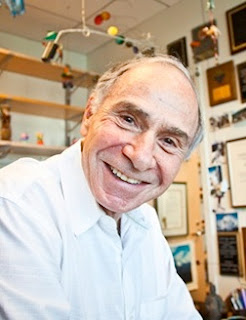Organic chemist Albert Padwa, who joined Emory in 1979, recently retired, leaving a legacy of great teaching and research, but also a collection of Calderesque mobiles that dangle, dip and twirl from the ceilings of chemistry department labs and offices. Padwa spoke with Emory Quadrangle magazine recently about his career and unusual hobby. Below is an excerpt:
“Mobiles are examples of kinetic art which bear a strong resemblance to the structure of complex organic molecules. Walk into the chemistry building at Emory, and the first thing you'll probably notice is a mobile. Walk on, and before you know it you'll be surrounded by the mobiles I've been creating for many years. I draw inspiration from Alexander Calder, the famous American sculptor credited with inventing the dangling art pieces.
"I started giving away some of my mobiles to my colleagues and staff members in the chemistry department many years ago. Almost everyone now has a mobile—roughly 50 of them adorn the various offices and corners of the chemistry department. I am fascinated by the way they float in 3-D space, have oddball shapes, but remain in balance. That's why I build them, much as I assemble complex natural products in my laboratory.
"I hope that my passion for collecting and creating mobiles will become part of my Emory legacy. Future generations of chemists may not remember me for my science, but there should be enough mobiles in the chemistry building to remind them of me.
“Chemistry opened up a world of experiences, seeing the world and interacting with students as well as colleagues from around the globe. I often tell my students that with immense hard work and sincere effort, anything is possible. But I also say that while it is extremely important for scientists to keep abreast of new knowledge through research, it is essential to maintain a proper balance between professional and nonprofessional activities, like my own hobbies of mountaineering, yoga, and my ever-expanding collection of mobiles. Would I do anything differently if I had to do it again? Certainly not!”
Related:
The art and science of symbiosis



No comments:
Post a Comment